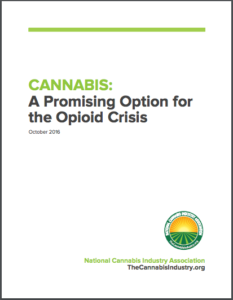 From Cannabis: A Promising Option for the Opioid Crisis:
From Cannabis: A Promising Option for the Opioid Crisis:
Jack Stiegelman returned from a 2004 deployment in Afghanistan with a debilitating back injury, for which doctors prescribed daunting amounts of morphine and muscle relaxants. But the medications never felt right.
“It wasn’t making my back better,” he says. “I was just numb for hours.”
Nor did the pills help with the PTSD that caused him to wake up screaming in the middle of the night and physically threaten his squad leader. Eventually, doctors cut off his pharmaceuticals, causing him to buy pain meds on the black market for years.
Relief only came when Jack began using medical cannabis, which allowed him to kick his opioid habit.
“The rage wasn’t there anymore,” he says. “It helped with the stabbing pains and relaxed my back spasms, and it helped me think clearly and stay in tune with my body.”
The opioid epidemic continues to ravage the country, with prescription painkiller and heroin overdoses now killing more Americans annually than car crashes. As state and federal policy makers grapple with the crisis, a new report details how increasing legal access to marijuana could be a potent weapon in the fight — saving lives and millions of dollars in health care and treatment costs.
Cannabis: A Promising Option for the Opioid Crisis, produced by the National Cannabis Industry Association (NCIA), reviews recent research showing significant progress in the fight against opioid addiction and death in states that have legalized access to cannabis in some form.
- A decade-long survey showed that medical cannabis states had 25% fewer opioid deaths over that period than other states.
- Medical cannabis states report a 28-35% reduction in opioid addiction treatment admissions.
- The average doctor in a medical cannabis state prescribes 1,826 fewer prescription painkiller doses per year than doctors in non-cannabis states.
- State medical cannabis programs were responsible for $165.2 million in Medicare prescription savings in 2013 and $178.5 million in Medicaid prescription savings in 2014.
Additional research indicates that cannabis is not only effective as an alternative to opioid use. It may also be an effective treatment for opioid addiction. One study of heroin-addicted rats found those that were treated with a cannabis extract were markedly less likely to seek out heroin again.
“The mounting evidence for cannabis as a tool in managing the opioid crisis is too important to ignore,” said NCIA executive director Aaron Smith. “Anyone who cares about saving lives and lessening the damage opioid abuse is wreaking across our country needs to read this report and consider what the research is telling us.”
The report also debunks the widespread but discredited “gateway theory” that cannabis use leads to hard drug use and makes recommendations for policy makers battling the opioid epidemic, including how to make cannabis access safer and more effective at the state level and how to resolve the current crippling conflicts between state and federal marijuana laws.
The full report can be read and downloaded at TheCannabisIndustry.org/CannabisAndOpioids.

Follow NCIA
Newsletter
Facebook
Twitter
LinkedIn
Instagram
–